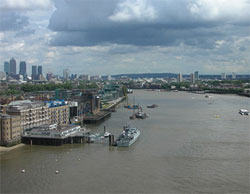British MPs to quiz Guardian editor on Snowden leaks

"Alan (Rusbridger) has been invited to give evidence to the home affairs select committee and looks forward to appearing next month," a spokeswoman for the daily told AFP.
The Guardian has been accused of endangering national security by publishing information about US and British spying programmes leaked by Snowden, a former contractor with the US National Security Agency (NSA).
However, the newspaper has strongly defended its actions, saying the publication has opened up a debate about secrecy, privacy, and freedom of speech.
There was no immediate comment from the home affairs committee, which is made up of elected members of parliament from Britain's three main political parties.
But its chairman, opposition Labour MP Keith Vaz, said last month that it would be investigating "elements of the Guardian's involvement in, and publication of, the Snowden leaks" as part of a wider inquiry into counter-terrorism.
Leaks lead to strained relations
The revelations over the past five months have sparked embarrassment and outrage in Washington by laying bare the huge scale of US spying, including on its allies.
They have also shone light on the surveillance programmes of Britain, a close ally of the United States, to widespread condemnation by politicians and intelligence chiefs here.
"Our adversaries are rubbing their hands with glee. Al-Qaeda is lapping it up," John Sawers, the head of British foreign spy agency MI6, told lawmakers on Thursday.
Leaks are 'very damaging'
"The leaks from Snowden have been very damaging, they put our operations at risk."
Iain Lobban, the head of the electronic listening station GCHQ, told the same hearing that terrorist groups had been heard discussing which of their communications were now known to be vulnerable.
Prime Minister David Cameron had previously warned that the leaks have "damaged national security", and threatened the Guardian with injunctions if it does not stop publishing.
Intelligence agencies were 'saved'
The newspaper destroyed some of the data it was given because it said the government had threatened to use legal action to block its publication.
But the daily, which also published files obtained by whistle-blowing website WikiLeaks, insists it has handled the highly sensitive information in a responsible manner.
In an editorial this week, the Guardian said the anger against the leaks was misplaced, focusing on the media who published them rather than the agencies who lost the data.
"The intelligence agencies were saved from true catastrophe by only one thing: the fact that Snowden didn't dump the material on to the web, but handed it instead to journalists," the editorial said.
"Together with the New York Times and Washington Post, we have worked carefully and responsibly (in consultation with governments and agencies) to disclose a small proportion of what he leaked."
Snowden is currently in Russia where he has been granted temporary asylum as he tries to evade US prosecution for espionage.
Source: AFP, via I-Net Bridge
Source: I-Net Bridge

For more than two decades, I-Net Bridge has been one of South Africa’s preferred electronic providers of innovative solutions, data of the highest calibre, reliable platforms and excellent supporting systems. Our products include workstations, web applications and data feeds packaged with in-depth news and powerful analytical tools empowering clients to make meaningful decisions.
We pride ourselves on our wide variety of in-house skills, encompassing multiple platforms and applications. These skills enable us to not only function as a first class facility, but also design, implement and support all our client needs at a level that confirms I-Net Bridge a leader in its field.
Go to: http://www.inet.co.za






